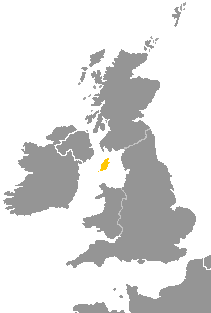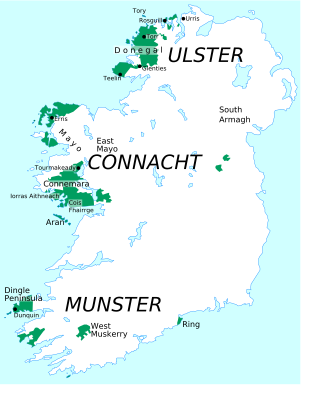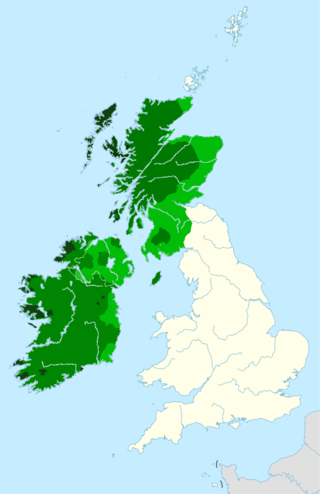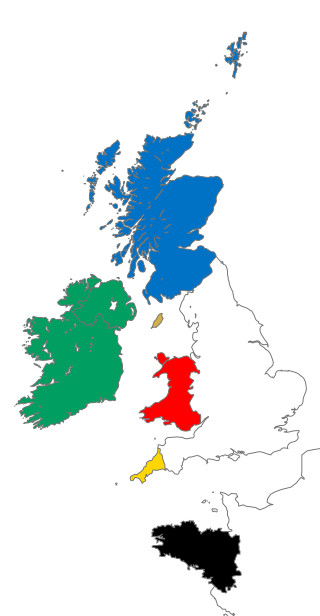Sláinte means "health" [1] in both Irish and Scottish Gaelic. It is commonly used as a drinking toast in Ireland, Scotland and the Isle of Man. However, the toast is also increasingly being used in other countries within the whisky community. [2]
Sláinte means "health" [1] in both Irish and Scottish Gaelic. It is commonly used as a drinking toast in Ireland, Scotland and the Isle of Man. However, the toast is also increasingly being used in other countries within the whisky community. [2]
| Pronunciation | ||
|---|---|---|
| English: | slainte | /ˈslɑːntʃə/ SLAHN-chə [3] |
| Irish: | sláinte (mhaith) | [ˈsˠl̪ˠaːn̠ʲtʲə(wa)] [4] |
| Scots Gaelic: | slàinte (mhath) | [ˈs̪l̪ˠaːɲtʲʰə(va)] |
| Scots Gaelic: | do dheagh shlàinte | [t̪əʝoːˈl̪ˠaːɲtʲʰə] |
| Scots Gaelic: | slàinte mhòr | [ˈs̪l̪ˠaːɲtʲʰəvoːɾ] |
| Manx: | slaynt vie | [slentθvaːi] [5] |
| Manx: | corp slaynt | [kʰoɾpʰslentθ] [5] |

Sláinte is the basic form in Irish. Variations of this toast include sláinte mhaith "good health" in Irish (mhaith being the lenited form of maith "good"). In Irish, the response to sláinte is sláinte agatsa, which translates "to your health as well".
The basic Scottish Gaelic equivalent is slàinte (mhath), with the same meaning, to which the normal response is do dheagh shlàinte "your good health". [6] There are other variations such as:
The Manx Gaelic form is slaynt (vie) [9] or shoh slaynt. [10] Alternatively, corp slaynt "healthy body" is also used in Manx. [5]
The word is an abstract noun derived from the Old Irish adjective slán "whole, healthy" plus the Old Irish suffix tu, resulting in slántu "health" and eventually Middle Irish sláinte. [11] [12] The root slán is derived from the Indo-European root *slā- "advantageous" and linked to words like German selig "blessed" and the Latin salus "health". [13]
In some modern Romance languages, words descended from the Latin word salus (such as salute in Italian, salut in Catalan and Romanian, salud in Spanish) are similarly used as a toast. (However, sănătate in Romanian, santat in Occitan and santé in French are from Latin sanitas "health.")
The Goidelicgoy-DEL-ik or Gaelic languages form one of the two groups of Insular Celtic languages, the other being the Brittonic languages.

Hogmanay is the Scots word for the last day of the old year and is synonymous with the celebration of the New Year in the Scottish manner. It is normally followed by further celebration on the morning of New Year's Day and in some cases, 2 January—a Scottish bank holiday. In a few contexts, the word Hogmanay is used more loosely to describe the entire period consisting of the last few days of the old year and the first few days of the new year. For instance, not all events held under the banner of Edinburgh's Hogmanay take place on 31st December itself.

Loch is the Irish, Scottish Gaelic and Scots word for a lake or sea inlet. It is cognate with the Manx lough, Cornish logh, and one of the Welsh words for lake, llwch.

Manx, also known as Manx Gaelic, is a Gaelic language of the insular Celtic branch of the Celtic language family, itself a branch of the Indo-European language family. Manx is the historical language of the Manx people.

Scotia is a Latin placename derived from Scoti, a Latin name for the Gaels, first attested in the late 3rd century. The Romans referred to Ireland as "Scotia" around 500 A.D. From the 9th century on, its meaning gradually shifted, so that it came to mean only the part of Britain lying north of the Firth of Forth: the Kingdom of Scotland. By the later Middle Ages it had become the fixed Latin term for what in English is called Scotland.
A clan is a group of people united by actual or perceived kinship and descent. Even if lineage details are unknown, clans may claim descent from founding member or apical ancestor. Clans, in indigenous societies, were not endogamous, meaning that their members can not marry one another. Clans preceded more centralized forms of community organization and government, and exist in every country. Members may identify with a coat of arms or other symbol. Kinship-based groups may also have a symbolic ancestor, whereby the clan shares a "stipulated" common ancestor who serves as a symbol of the clan's unity.

A toast is a ritual during which a drink is taken as an expression of honor or goodwill. The term may be applied to the person or thing so honored, the drink taken, or the verbal expression accompanying the drink. Thus, a person could be "the toast of the evening", for whom someone "proposes a toast" to congratulate and for whom a third person "toasts" in agreement. The ritual forms the basis of the literary and performance genre, of which Mark Twain's "To the Babies" is a well-known example.
Tarbert is a place name in Scotland and Ireland. Places named Tarbert are characterised by a narrow strip of land, or isthmus. This can be where two lochs nearly meet, or a causeway out to an island.

Manx English, or Anglo-Manx, is the historic dialect of English spoken on the Isle of Man, though today in decline. It has many borrowings from Manx, a Goidelic language, and it differs widely from any other variety of English, including dialects from other areas in which Celtic languages are or were spoken, such as Welsh English and Hiberno-English.

Ulster Irish is the variety of Irish spoken in the province of Ulster. It "occupies a central position in the Gaelic world made up of Ireland, Scotland and the Isle of Man". Ulster Irish thus has much in common with Scottish Gaelic and Manx. Within Ulster there have historically been two main sub-dialects: West Ulster and East Ulster. The Western dialect is spoken in County Donegal and once was in parts of neighbouring counties, hence the name Donegal Irish. The Eastern dialect was spoken in most of the rest of Ulster and northern parts of counties Louth and Meath.
Dr. Caoilfhionn Nic Pháidín is an author and academic, previously of Dublin City University, Dublin, Ireland. She served on the government agency Coimisiún na Gaeltachta from 2000 to 2002. She is also a co-founder of the Irish language publishing firm Cois Life.

Fáilte, Fàilte or Failt is a Gaelic word meaning "welcome".
Órla, Orlaith, Orla or Orlagh is a given name of Celtic origin. The root form of the name is Órfhlaith, interpretable as "golden princess" as it combines the Gaelic elements ór ("gold") and fhlaith, its full feminine form being banfhlaith.
Sláinte is a toast in Irish and Scottish Gaelic meaning "health".

Irish, or Gaelic, also sometimes known outside Ireland as Irish Gaelic, is a Goidelic language of the Insular Celtic branch of the Celtic language family, which is a part of the Indo-European language family. Irish is indigenous to the island of Ireland and was the population's first language until the 19th century, when English gradually became dominant, particularly in the last decades of the century. Today, Irish is still commonly spoken as a first language in areas of Ireland collectively known as the Gaeltacht, in which only 2% of Ireland's population lived in 2016. It is also spoken by a larger group of habitual but non-traditional speakers, mostly in urban areas where the majority are second-language speakers. A large number of Irish-Americans, over 22,000, reported speaking Irish as their first language at home in the United States, with several times that number claiming "some knowledge" of the language.

Surnames originating on the Isle of Man reflect the recorded history of the island, which can be divided into three different eras — Gaelic, Norse, and English. In consequence most Manx surnames are derived from the Gaelic or Norse languages.

The Gaels are an ethnolinguistic group native to Ireland, Scotland and the Isle of Man. They are associated with the Gaelic languages: a branch of the Celtic languages comprising Irish, Manx and Scottish Gaelic.

Alba is the Scottish Gaelic name for Scotland. It is also, in English language historiography, used to refer to the polity of Picts and Scots united in the ninth century as the Kingdom of Alba, until it developed into the Kingdom of Scotland of the late Middle Ages following the absorption of Strathclyde and English-speaking Lothian in the 12th century. It is cognate with the Irish term Alba and the Manx term Nalbin, the two other Goidelic Insular Celtic languages, as well as contemporary words used in Cornish and Welsh, both of which are Brythonic Insular Celtic languages. The third surviving Brythonic language, Breton, instead uses Bro-Skos, meaning 'country of the Scots'. In the past, these terms were names for Great Britain as a whole, related to the Brythonic name Albion.

In addition to English, literature has been written in a wide variety of other languages in Britain, that is the United Kingdom, the Isle of Man and the Channel Islands. This includes literature in Scottish Gaelic, Welsh, Latin, Cornish, Anglo-Norman, Guernésiais, Jèrriais, Manx, and Irish. Literature in Anglo-Saxon is treated as English literature and literature in Scots as Scottish literature.